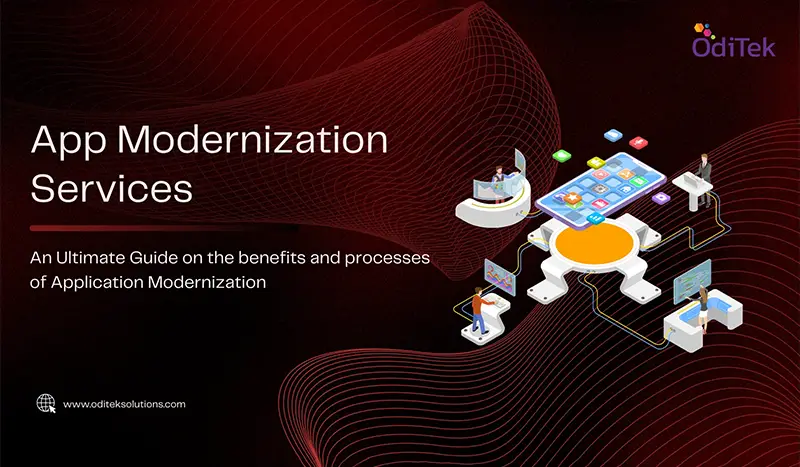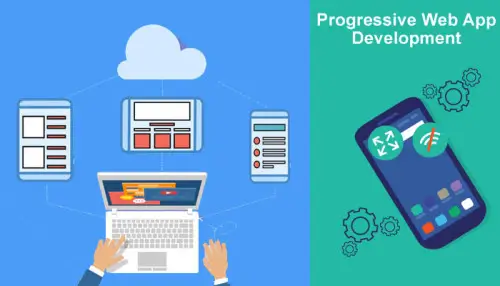Application modernization is crucial for businesses in today’s rapidly evolving technological landscape. It serves as the cornerstone of staying competitive and meeting ever-changing customer expectations. App modernization services enables companies to harness the full potential of their software assets.
Application modernization framework offers several vital benefits. Firstly, they enhance operational efficiency, reducing maintenance costs associated with outdated applications. Modernized apps are more agile, adaptable, and scalable, aligning with evolving business needs. Moreover, app modernization enhances security, addressing vulnerabilities that could lead to data breaches or compliance issues. It also fosters innovation by enabling the integration of cutting-edge technologies like AI and cloud computing.
Path to Application Modernization: The App Modernization Process
In today’s ever-evolving business landscape, application modernization has become a strategic imperative for organizations looking to stay competitive and meet the ever-increasing demands of customers and stakeholders. This comprehensive process, involving a series of well-defined steps and leveraging app modernization services, plays a pivotal role in ensuring that your business applications remain effective, secure, and aligned with your evolving business goals. Here’s an in-depth look at the application modernization process:
1. Application Modernization Assessment
The journey typically begins with an application modernization assessment. This crucial step involves a comprehensive evaluation of your existing application landscape. It includes scrutinizing the technologies, architecture, and infrastructure of your applications, as well as identifying any performance bottlenecks, security vulnerabilities, and outdated components.
2. Defining Business Goals
Before diving into modernization efforts, it’s essential to have a clear understanding of your business objectives. What do you aim to achieve through modernization? This could involve improving user experiences, increasing operational efficiency, enhancing security, or enabling new features and capabilities.
3. Developing a Modernization Strategy
Based on the assessment and your defined business goals, you can formulate a modernization strategy. This strategy outlines how each application will be addressed. Depending on the specifics of each application, you may choose to rehost, refactor, rearchitect, rebuild, or even replace them.
4. Resource Allocation
To successfully execute your modernization strategy, allocate the necessary resources. This includes budget allocation, securing skilled personnel, and ensuring you have the right technology infrastructure in place.
5. Prioritization
Not all applications are equal in terms of their importance to your business. Prioritize your applications based on factors like business value, technical debt, and criticality. This ensures that you focus your efforts where they will have the most significant impact.
6. Execution and App Modernization Services
The execution phase involves implementing your modernization plan for each application. Depending on your chosen approach (rehosting, refactoring, rearchitecting, rebuilding, or replacing), this may entail rewriting code, migrating to modern platforms, adopting cloud technologies, or integrating new APIs. This is where app modernization services play a crucial role, as they bring expertise and experience to the table, ensuring a smooth and efficient modernization process.
7. Testing and Quality Assurance
Rigorous testing is essential to ensure that modernized applications meet quality, performance, and security standards. Comprehensive testing helps identify and address any issues before applications are deployed into production environments.
8. Deployment and Beyond
Once your modernized applications pass testing, they are ready for deployment into production environments. However, the modernization process doesn’t end here. It’s crucial to establish continuous monitoring to track the performance and security of these applications. Regularly review and optimize them to keep them aligned with evolving business needs and emerging technologies.
In addition to these core steps, governance and compliance are also vital considerations. Ensure that modernized applications comply with industry regulations and internal governance standards to avoid potential legal or compliance issues.
Unlocking Business Success: Application Modernization Benefits
Application modernization offers a wide array of benefits for businesses, encompassing everything from cost savings to enhanced agility. In this digital age, where technology evolves at breakneck speed, keeping your software applications up to date is essential for maintaining a competitive edge. Let’s delve into the seven key benefits of app modernization in a business context:
1. Cost Reduction and Efficiency Enhancement
Application modernization tools and services help organizations optimize their IT spending. Legacy applications often incur high maintenance costs and are inefficient in terms of resource utilization. By modernizing these apps, companies can streamline operations, reduce unnecessary expenses, and make the most of their IT investments. Modernized apps are designed to run more efficiently, requiring fewer resources and reducing infrastructure costs.
2. Enhanced Agility and Adaptability
In today’s fast-paced business environment, the ability to adapt quickly to changing market conditions is paramount. Application modernization allows businesses to achieve greater agility. Modernized applications are built to be more flexible and scalable, making it easier to respond to shifting customer demands, market trends, and competitive pressures. This agility enables organizations to seize new opportunities and pivot as needed without being hindered by legacy systems.
3. Improved User Experience and Customer Satisfaction
Modernizing applications often involves enhancing the user interface and user experience (UI/UX). This can result in more intuitive, responsive, and visually appealing applications that are easier for customers and employees to use. A better user experience translates to higher customer satisfaction, increased user engagement, and potentially higher revenues. Happy customers are more likely to remain loyal and recommend your services to others.
4. Security Enhancement and Compliance
Legacy applications are more vulnerable to security threats due to outdated code and security protocols. App modernization services can help organizations bolster their cybersecurity posture. Modernized applications are designed with the latest security measures in mind, including robust encryption, authentication, and access control mechanisms. This is particularly important as data breaches and cyberattacks become increasingly common. Moreover, modernized apps can be more easily kept in compliance with industry regulations and data protection laws.
5. Integration and Interoperability
Many businesses rely on a diverse set of software applications, and these applications must work together seamlessly. Legacy systems often lack the ability to integrate with newer technologies and platforms. App modernization can bridge these integration gaps, enabling data and functionality to flow smoothly across different systems. This promotes better collaboration, data sharing, and decision-making within the organization. It also opens the door to the adoption of modern technologies such as cloud computing and IoT, which can drive innovation and efficiency.
6. Innovation and Competitive Advantage
Staying competitive in today’s market requires continuous innovation. Modernized applications are better positioned to take advantage of emerging technologies like artificial intelligence, machine learning, and big data analytics. By modernizing their apps, businesses can leverage these technologies to gain insights, automate processes, and create innovative products and services. This can provide a significant competitive advantage, allowing them to differentiate themselves from rivals and meet evolving customer expectations.
Conclusion
In short, application modernization is vital for businesses seeking to thrive in today’s dynamic landscape. It offers cost savings, agility, security, improved user experiences, and the ability to leverage new technologies.
OdiTek, with its expertise and experience, provides comprehensive app modernization services , including iPaaS, to help businesses unlock their full potential, enhance competitiveness, and stay at the forefront of innovation in the ever-evolving digital world.







